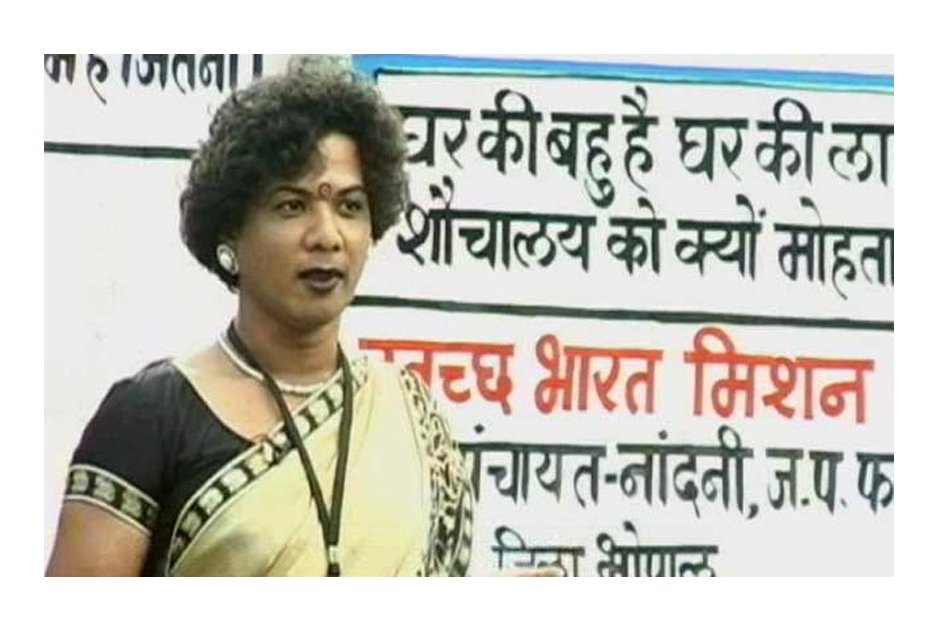
This Transgender Is Using Her Skills To Spread The Message Of Sanitation In Villages Of MP
8 Dec 2015 1:45 PM GMT
Editor : Richa Verma Verma
I have done my graduation and post graduation in English Literature from Miranda House, Delhi University. Writing is my passion and I believe words have immense power which can shape the thoughts of an individual as well as the nation.
Image Source: NDTV
Unless we have a short memory, The Logical Indian community remembers the horrid news of two teenage girls from Katra, in Badaun, Uttar Pradesh, who had been found hanging from a mango tree on the morning of 27th May, 2014. The cousins aged 14 and 15 had gone missing from their houses the night before. It had been alleged that the girls had been raped when they had gone to relieve themselves in the open in the dark of the night. The post-mortem investigation stated the cause of death as gang-rape and strangulation. A CBI report later refuted the claim given by an “incompetent” physician earlier and gave the verdict that the medical investigation did not give any evidence of rape. The accused were discharged from police custody.
Here, we are not discussing the authenticity of claims by various stakeholders, though it is a potent issue in itself. We are instead focusing on the reason why the two teenagers had to go out of their houses at night – allegedly to relieve themselves in the open, at an hour when they would not feel ashamed of being seen by anyone defecating in the open.
We are living in a country where 56 rapes are reported as a daily average, according to a Commonwealth Human Rights Initiative (CHRI) analysis. That amounts to a whopping one rape per half an hour! We do not have access to any record about the instances contributed due to open-defecation by women in India. However, we do know that around 53% of Indian population has no access to any sort of private toilets, according to the World Bank. Women who do not have toilets have no option but to relieve themselves in the open, usually at the risky hours of night or dawn. This makes them easy targets of sexual assaults.
Our Prime Minister’s Swachh Bharat Mission aims to address this key area by providing satisfactory sanitation facilities to women, particularly in rural India, so as to curb the incidence of sexual assaults on women due to lack of proper toilets.
Under this mission, the state government of Madhya Pradesh approached the NGO Mitra Shringaar last year. The government wanted to tap this NGO for spreading the campaign from door to door. The NGO is run by Ms Sanjana Singh, a 30-year-old transgender. Initially her team had been reluctant to approach the villager but relented when persuaded. “It’s a good opportunity given by the state government. I could not say no and became part of the campaign. It has helped me prove to the society that we transgenders are capable of doing more than entertaining people,” Says Ms Singh.
Miss Singh and her team have been making innovative use of their singing and dancing skills to spread awareness about and importance of better sanitation facilities. The villagers were reluctant to listen to the third gender initially, but Ms Sanjana and her team determinedly perused the cause. Finally, bias failed and logic prevailed!
The rural women understood the importance of what the NGO was trying to push through. They realized how beneficial it would be to take government help to build private toilets for themselves. It was not only important for hygiene and sanitation but also an effective measure to prevent lewd comments and sexual assaults. The villagers are now highly appreciative of the NGO’s endeavours and feel obliged to it for bringing to light such a crucial weapon of empowerment for rural women.
Due to the efforts of Mitra Shingaar, 12 villages in Bhopal district have become cleaner. While all the 131 homes in Naandini village now boast of a private toiler, the remaining 11 villages have private toilets in 80% of the houses. Since this team of dedicated, selfless members has been successful so far, the state administration is now of the view that they spread the campaign to another 40 villages.
The Logical Indian community lauds the efforts of Ms Sanjana and her team for undertaking this noble cause and making it successful. At the same time we congratulate those villagers who overcame their hesitation of talking to the transgender community and implemented their advice. We sincerely hope that the next forty villages commissioned under Mitra Shringaar may avail of the benefits of the scheme. We also wish that similar efforts would be undertaken by state governments of other states in India.
 All section
All section













